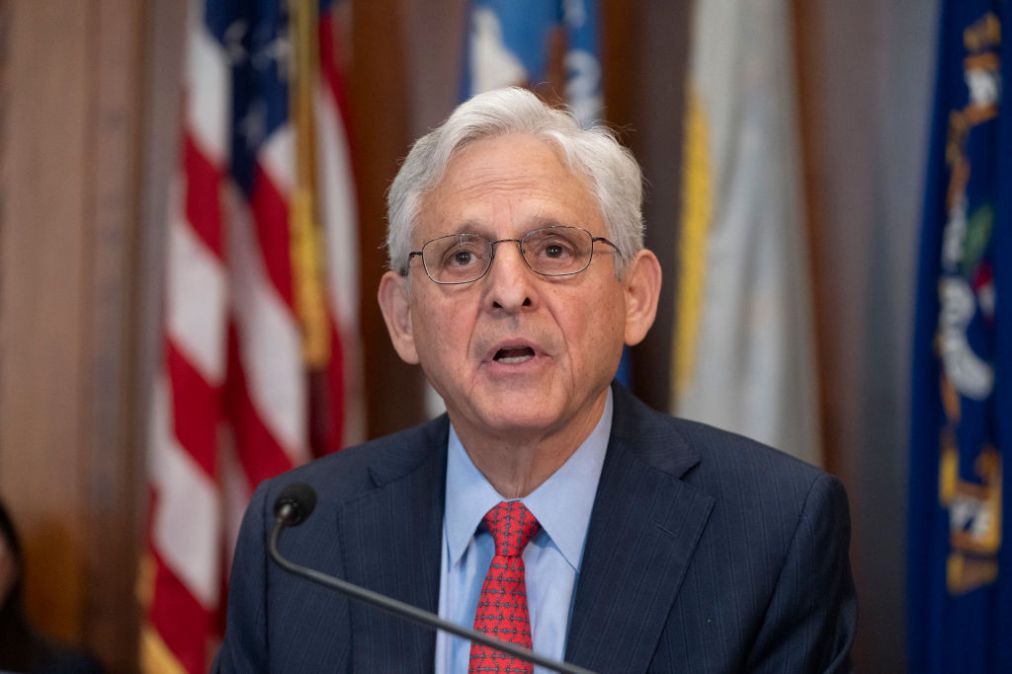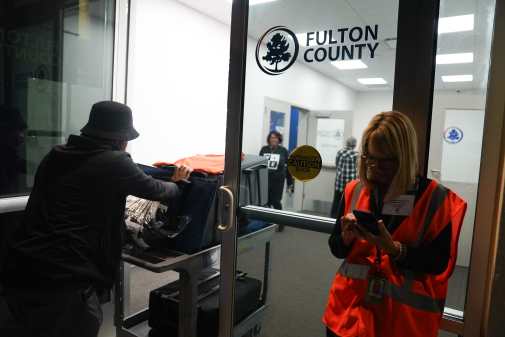Justice Department accuses Russia of interfering with 2024 elections

The U.S. government formally accused Russia of attempting to interfere in the 2024 elections, as the Department of Justice unveiled charges Wednesday against multiple individuals and seized dozens of domains they say were part of a wide-ranging campaign to influence American voters.
During a press conference, Attorney General Merrick Garland said the operations “make clear the ends to which the Russian government, including at its highest levels, is willing to go to undermine our democratic process.”
Two employees of Russia Today, Kostiantyn Kalashnikov and Elena Afanasyeva, were indicted in the Southern District of New York on charges they used foreign shell companies to direct $10 million to an unnamed Tennessee-based company to disseminate Russian disinformation on social media. They also allegedly invented a fictitious private investor to engage U.S.-based social media influencers with large followings to spread similar content.
According to the indictment, the U.S.-based company describes itself as “a network of heterodox commentators that focus on Western political and cultural issues.” An identical sentence is used on the website of Tenet Media, which lists numerous conservative commentators like Tim Pool, Lauren Southern, Benny Johnson and others as “talent.” A patent application filed in 2023 lists Tennessee-based addresses for both Tenet Media and its parent company Roaming USA Corp.
It’s not clear to what extent the founders of Tenet Media were aware their activities were being directly funded by the Russian government. The indictment includes numerous examples of messages between two of the founders where they discuss receiving payment from “the Russians” for their work.
On a call with reporters, a senior DOJ official declined to answer directly whether the U.S. government viewed Tenet Media or its founders as active participants in the scheme, citing an ongoing investigation. However, a senior Treasury official said the scheme involved RT executives seeking to “covertly recruit, unwittingly, American influencers in support of their malign activity.”
In a post on X responding to the allegations, Pool said he was unaware that the payments to Tenet Media were from the Russian government and that he has always had sole editorial control of content put out through his Culture War podcast.
“Should these allegations prove true, I as well as the other personalities and commentators were deceived and are victims. I cannot speak for anyone else at the company as to what they do or to what they are instructed,” he wrote.
CyberScoop has reached out to Tenet Media for comment.
David Becker, executive director of the Center for Election Innovation and Research, told CyberScoop that Russia’s use of direct contracts and formal business relationships with U.S.-based businesses was an “interesting” but rare tactic.
More common, he said, are domestic actors “wittingly or unwittingly doing the work of our foreign adversaries by spreading lies about elections.”
“I think we’ll see that through the election, perhaps all the way through Jan. 20,” Becker added.
Sen. Mark Warner, D-Va., chair of the Senate Intelligence Committee, said the announcement “underscores” what his committee has repeatedly warned the public about, namely that “foreign adversaries are acutely interested in meddling in our elections, using a wide range of tools to seek their preferred electoral outcomes and stoke division among Americans.”
The DOJ also announced that it had seized 32 internet domains that they claim were part of an effort by top officials close to President Vladimir Putin to use Russian public relations companies, including the Social Design Agency, in order to promote disinformation and state-sponsored narratives to sway the 2024 U.S. election.
As part of that effort, operatives from the prolific Russian disinformation group Doppelganger created fake websites and articles using typosquatted web domains to impersonate American news outlets like the Washington Post and Fox News.
In March, the U.S. government sanctioned the Social Design Agency for impersonating legitimate news websites in Europe and false personas online in support of the Russian government’s disinformation operations.
The Department of State also announced it was introducing new visa restrictions for foreign individuals that are found to have engaged in foreign influence operations, designating six individuals in the United States as agents of the Russian government, and offering a $10 million reward for information about ongoing foreign influence operations.
In July, U.S. intelligence officials described the Russian government as the most active foreign power seeking to influence the 2024 U.S. elections, aiming to support former President Donald Trump’s campaign, sway congressional races, and undermine public confidence in the American electoral system. Officials also said Russia, along with other countries, were increasingly leveraging witting and unwitting Americans and third-party commercial firms to mask their propaganda campaigns.
However, officials have also said these operations aren’t the same level of intensity as 2016. There are no indications thus far that Russian hackers have sought to compromise or disrupt voting machines, election software or other election infrastructure.
Also in July, the DOJ seized two U.S.-based domains and nearly 1,000 social media accounts that authorities said were part of a Kremlin-sponsored AI-powered bot farm that targeted audiences in the U.S. and abroad.
The FBI claims that RT played a central role in that operation. According to search warrants, RT led the development of Meliorator, a new AI tool designed to create unique social media personas “en masse,” post content, mimic ordinary social media users, and align their posts with other disinformation accounts and bots, according to a joint advisory.
Leadership at RT approved Meliorator, and less than a year later the project was folded into a new private intelligence organization created by the Russian Federal Security Service and approved by top Kremlin leadership in order to sow discord in the United States, according to court documents.
In response to an emailed request for comment, RT deputy editor-in-chief Anna Belkina sent CyberScoop a series of sarcastic, trolling responses, including that “2016 called and it wants its clichés back.”
This story was updated Sept. 4, 2024 with details on Tenet Media and quotes from David Becker.






